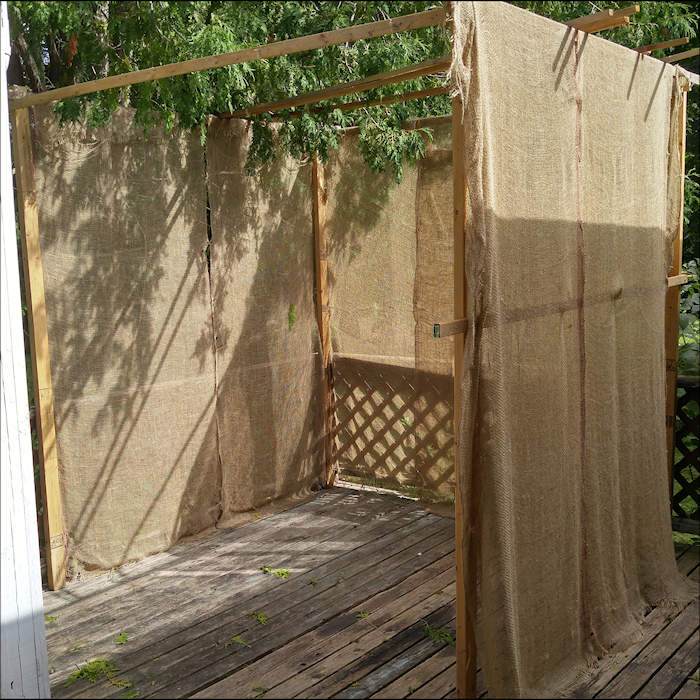For the week of September 29, 2018 / 20 Tishri 5779
Special note: I am posting this earlier in the week than I normally do. On Erev Shabbat (Sabbath eve), September 21, 2018, two tornadoes touched down in the Ottawa, Ontario/Gatineau, Quebec region. While we were slightly affected by the general weather event in that we only lost power for eight hours, others were not so fortunate. Some homes were completely destroyed and thousands may not have power for days. The beginnings of our little sukkah above surprisingly survived unscathed. I take this as a reminder of how most of the time we, vulnerable as we are, get through the challenges of life. May those who are still dealing with the aftermath of Friday’s storm be comforted and get back to normal soon.
By the way, the following message was composed prior to the weather event above.
Sukkot
Torah: Shemot/Exodus 33:12 – 34:26; B’midbar/Numbers 29:26-34
Haftarah: Ezekiel 38:18 – 39:16
Download Audio [Right click link to download]
And he said to him, “If your presence will not go with me, do not bring us up from here.” (Shemot/Exodus 33:15)
One of the most successful advertising campaigns of all time featured the slogan, “Don’t leave home without it.” American Express claimed to provide security in the midst of the unknown. To leave home is to be unsafe. You never know what is going to happen out there in the wild of the outside world. What are you going to do if you encounter the challenges of life? You don’t on your own possess whatever resources you may need. But don’t worry, American Express will take care of you!
This week’s parsha (Torah reading portion) is special as it falls in the middle of the week-long festival of Sukkot (English: Booths or Tabernacles. A key aspect of these days is that they address the same human need that the Amex campaign exploited: vulnerability. During Sukkot, the people were to move out of their permanent dwellings and live in temporary shelters to remember how their ancestors dwelt in the wilderness for forty years prior to entering the Promised Land. The Torah reads:
You shall dwell in booths (Hebrew: sukkot) for seven days. All native Israelites shall dwell in booths, that your generations may know that I made the people of Israel dwell in booths when I brought them out of the land of Egypt: I am the LORD your God (Vayikra/Leviticus 23:42-43).
For a week every year, they were to leave home. They were to journey from security to insecurity. By purposely making themselves vulnerable, they relived, to some extent, the sense of vulnerability experienced for decades by an earlier generation. This was an object lesson to learn that their security was not in their permanent dwellings, but in the same God who miraculously took care of their predecessors. This was so that upon returning to their homes, they would understand that their security was not due to the work of their own hands, but because of the Master of the Universe. God is our security, taking care of us by any means he chooses, whether it be within buildings of our making or in the desert.
Moses understood this. Following the debacle of the Golden Calf, when the nation was at risk of complete destruction, Moses was receiving instructions from God in preparation for the next stage of their journey. He had a non-negotiable. You might think it strange that a human could relate to God like that, but perhaps you haven’t really read the Bible. The name Israel means, “he who strives with God,” hearkening back to God’s word to Abraham’s grandson Jacob: “Your name shall no longer be called Jacob, but Israel, for you have striven with God and with men, and have prevailed” (Bereshit/Genesis 32:28). God invites us to struggle with him. Moses knew that. So he insisted: “If your presence will not go with me, do not bring us up from here.” (Shemot/Exodus 33:15). Moses anticipated the challenges ahead. He was willing to face them, but not alone. Without the presence of God, he wasn’t going anywhere.
We don’t have to go out of our way to recreate wilderness experiences. God leads us into all kinds of situations where we are vulnerable, unsafe, and insecure. It’s natural when that happens to protect ourselves accordingly. But do our humanly devised solutions truly give us the protection we need? It can look that way at times, but do they really? Whether it be literal walls of defense or the innumerable emotional survival techniques we devise, we are far more vulnerable than we care to admit. Without God’s presence, we are in grave danger.
The good news is that we don’t have to go it alone. As God was with Israel in the wilderness, he is willing to be with us in whatever impossible situation we might find ourselves in. His miraculous presence is available to anyone who places their trust in the Messiah Yeshua. But something I am learning, is that we shouldn’t take his presence for granted. While we can be confident that he is with us, we can easily default to self-reliance. We offer a little prayer over our shoulders, while actually finding security in our abilities and possessions, not to mention our credit cards. Perhaps, we are well advised to take the time to stop and make sure we are not leaving home without him.
Scriptures taken from the English Standard Version
